#vnc analysis
Text
Ok, so Noé and Vanitas exist in two different types of Vampire Novels. Explained below the cut, because it's long.
Starting with Vanitas:
This man is in a tragic romance novel. He is the hero of the day, he is a charming and handsome doctor, he is the savior of all the beautiful people. He choose a strong handsome man to always be ready to rescue him and for him to always be ready to rescue. The entire time we see him he never asks anyone else to join him in his quest--just Noé, at the beginning of the story, immediately upon meeting him. And Noé lives up to his role. He is reluctant but starry eyed, strong and handsome and pure, 110% behind Vanitas's cause.
We can see this intent in the way Vanitas, multiple times, flings himself into Noé's way. He makes sure Noé is watching when he kisses someone else (just to tease her, he says, fully aware that Jeanne as she is will never actually return those feelings.) He is listening at the door when his chosen lead has a "dalliance" with someone else. He immediately retaliates against this by allowing Jeanne to drink his blood, both discovering what exact experience Noé was having with Domi and furthering Noé's interest in him (I don't kiss and tell, with a hand over the wound.)
He has only a few purposes to his life at this point: Be a hero (save the vampires), fall in love and be loved (as stated by Luna and his own desire for salvation. What is salvation for a man who is unlovable? Those two scenes are placed where they are for a reason.), die.
That's why he is acting all the time, that's why he says he'll do as he pleases, that's why when he saves someone it is theatrical and handsome and romantic. He's living out a romance novel in the time he has left and I truly think Noé is his leading man. He has allowed himself to be the leading man for someone else in Jeanne. He's willing to (and I suspect may actually be faced with the task) kill Jeanne, but he cannot and will not kill Noé. In fact, he plans on Noé being in his final act--the tragic part of his tragic romance. To die by the hands of the one he loves, to die knowing he is loved by the person who kills him. That he died himself, and with mercy.
But this leads into Noé, who is NOT living in a tragic romance.
Noé is living in a horror novel. He is afraid, and the people he cares about are hurting, and it has been placed on HIS shoulders to save as many people from the Horrible Terrifying Creature who Twists People before they can be twisted too far.
We can see this in the fact that Teacher gives him instructions--these are not whimsical well wishes. There is not the kindness or love in Luna telling Vanitas he will find someone to love him, if he only opens himself to it. This is Teacher telling Noé on no uncertain terms: Do not give up your name--it is everything you are. Find the book of Vanitas and study those who interact with it, become enmeshed in their lives. Decide how this book is being used and what it means.
For Noé, people he loves are already gone due to the monster that is Charlatan. And he tries to destroy it every time he sees her. And he even almost falls to it! (But Vanitas, in his romantic gestures, saves Noé before he can be taken, until he doesn't, because Ruthven obviously has a large hand in this corruption.) Noé is a consistent victim of this monster--first Louis, but also it is Amelia who we first see bite him without his permission, draining him of power that he NEEDS to save her, because his instinct (despite knowing, he has to know, he's seen it before) is to save her anyway.
And he's got psychological trauma. He's got ptsd that results in bursts of anger and fear and causes him to act without thinking. His only weapon against this monster that could destroy him and his entire world is a man who doesn't seem to understand the extent to which Noé NEEDS him to succeed as often as possible. And so he's stuck trying to figure out his ONLY defense against this monster that twists people into shells.
And then he finds out his teacher is also a monster. A different kind, but a monster nonetheless. And you have to wonder, seeing Misha, does he not wonder about his own upbringing? About the things his teacher has told him? Noé constantly has the rug pulled out from under him, is constantly getting blood taken from him without his permission, constantly having to drink blood because of his abilities without his permission, constantly being taken hostage.
He's the protagonist of a horror novel who knows nothing about the monster except that it's terrifying and a threat to everything he cares about and he's been told by another monster that he's the special guy who has to figure out how to save everyone.
And again, he's faced with someone he loves, someone he clearly is IN LOVE WITH, telling him that it's him who must kill them. Before they become a monster. Before they become someone other than themselves. His literal worst nightmare, coming around to repeat itself again.
See, different genres.
And it works best like this. If Noé was the one living in a romance novel, Vanitas wouldn't have lasted two seconds before he was swept off his feet.
If Vanitas was living in a horror novel. Well. He already did. He'd collapse under the weight of another one.
347 notes
·
View notes
Text
TENTATIVE ANALYSES: THE CASE STUDY OF VANITAS
Episode 9: Réminiscence
NARRATIVE STRUCTURE
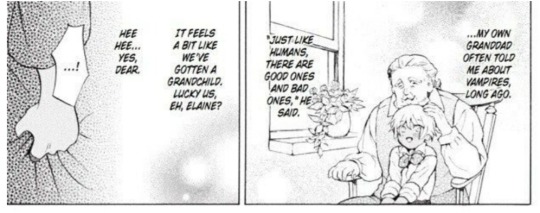
This chapter is essentially a single long flashback of Noé', finally detailing part of hos origins and his actual relationship woth Louis.
Noé was a vampire orphan raised by a couple of elderly humans; when they died, he was picked up by some slavers, and ultinately sold to the one he calls 'Teacher'. He was brought to the latter's house, where his grandchildren either lived permanently (Louis) or visited frequently (Dominique). They becamehis friends and playmates, along with a bunch of other local children; but gradually, Louis drifted away.
Then, one of their friends was taken away as a cursebearer, Noé and Dominique wanted to go and save her, but Louis opposed them, with the famous taunt about not being able to do anything.
Turns out, he himself was a cursebearer; to save his friends from the other he ended up giving in and losing himself, about to kill Noé, and only Teacher's timely intervention prevented it. Problem is, the intervention consisted in decapitating Louis in front of his sister and friend.
NARRATIVE TECHNIQUES
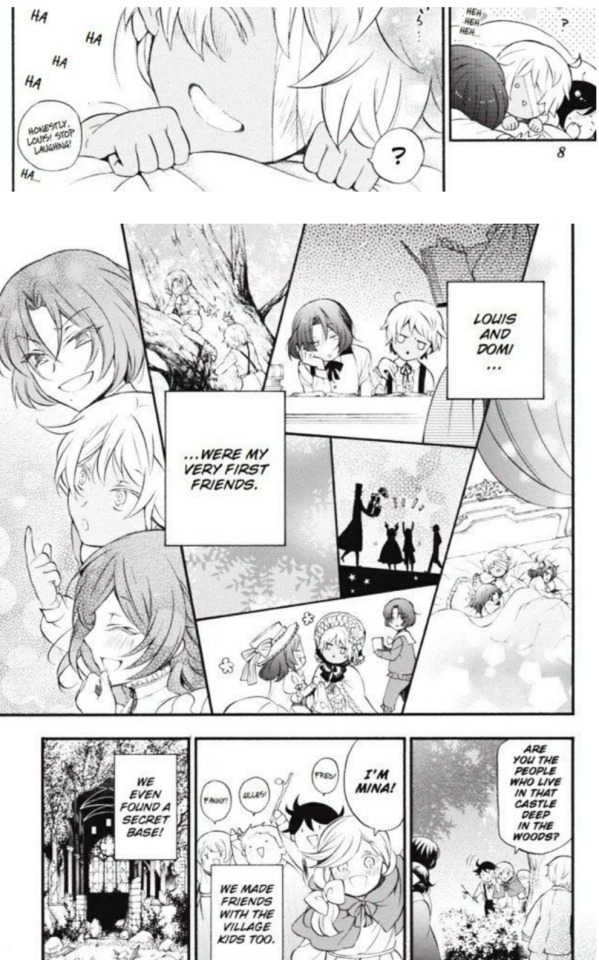
As said, this chapter is a huge flashback; one that dies a throughout reframing of another shown previously.
Before, the memory of Louis had seemed antagonistic, the voice of someone just putting Noé down; now it appears as it actually was, a cry of despair of someone who had been staring death in thebface for quite some time.
That 'there's nothing you can do' is no more a sneer; it is a representation of Noé's sense of guilt and the root of his desire to see that Vanitas dies his job.
CHARACTERS
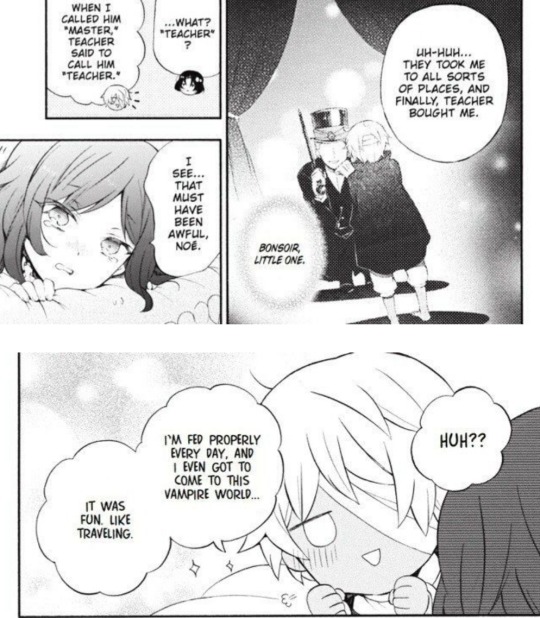
• Noé: we learn a few more things on his personality, besides his past. One, that his being a cute ball of sunshine comes with a lot of denial. Just see the scene when he talks about his time with the slavers: Dominique reacts like a normal person, says that it must have been awful, and Noé is there happily denying this and talking about all the different places he saw. This while sporting a bandage on his left eye that clearly wasn't caused by Teacher or his grandparents. Besides this, his desire to save others is confirmed as stemming from guilt at saving Louis, either by healing him or by putting him out of his misery, and for daring to have the very normal feeling of relief at being alive - that came at the cost of his friend's life.
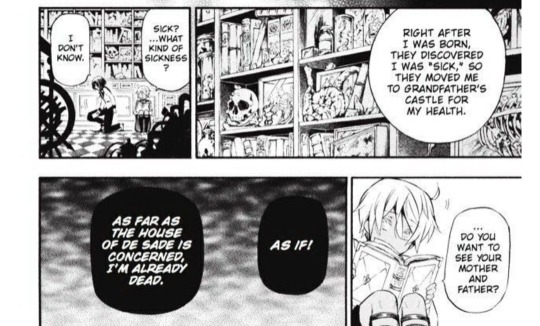
Louis: he is finally introduced properly, and he appears a lot more positively than he has been depicted so far. He teases Noé, even in a somewhat cruel way, but at the start, he's just a slightly mean kid. Then he finds out a painful secret about himself, that he is a cursebearer, and his outlook in life changes. He grows even more resentful of his family casting him far away; he grows detached from his friend group; he spends his time making weapons for Noé to kill him with, lyong about his purposes. He is a type of person who keeps his cool; the one time he loses it, is when he yells at Noé and Domi for their naive assumption that they can save a cursebearer. Ultimately, he succumbs to his curse partly to gain the power to save them, and ironically, these same out of control powers lead him to exterminate all the friend group and almost Noé himself. All in all,a downright tragic character.

Dominique: she is surprising for how starkly different she appears to be from her current self. She used to be extremely girly and shy, even if her crush on Noé was there all the time; the personality she exhibits in the present day looks remarkably like Louis'.
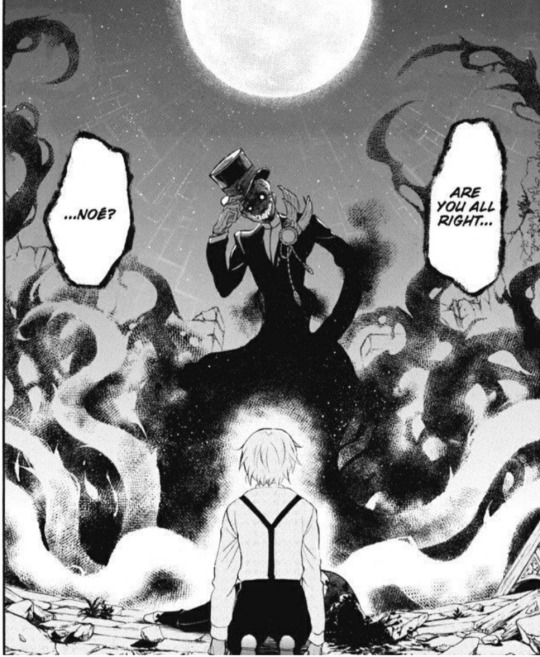
Teacher: he starts appearing as even more ambiguous than before. He is the one who adopts the enslaved Noé to treat him well, but he is also the one who treats his grandson as a case study, just for being a cursebearer, showing him indifference at best, abd beheading without a second thought once he gets out of control.
THEMES
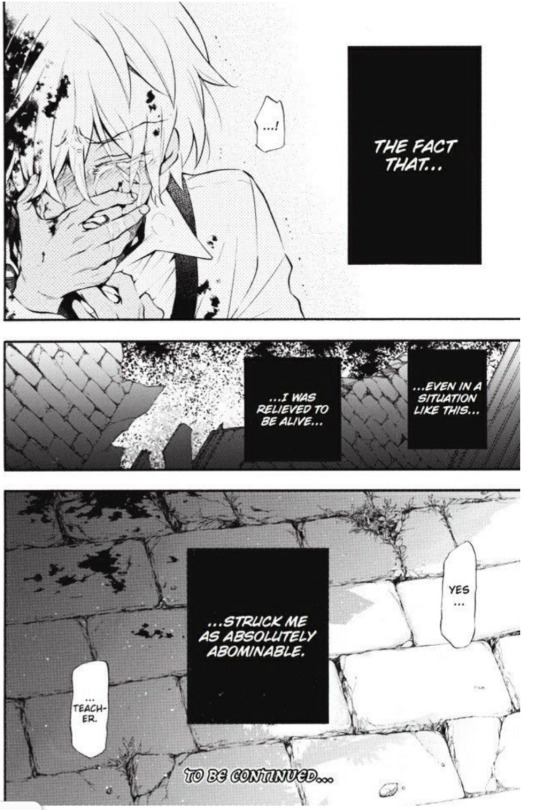
The theme of 'killing the ones you love' makes its great entrance. In this case, is the would-be killed's request to be so, as a way to go decently instead of beheaded out of burocracy. A killing that is seen as a gesture of love, and so Noé's failing to comply appears, at least in his own eyes, as a terrible weakness he must atone for.

Another is the theme of 'salvation': Noé failed to do anything with Louis, be it killing him or healing him from his curse. Not that anyone expected he did, least of all Louis: kid is clearly terrified of his fate, and sees no exit. Noé sees tue healings Vanitas performs as a remedy to that, and also to his own sense of guilt.
SYMBOLISM
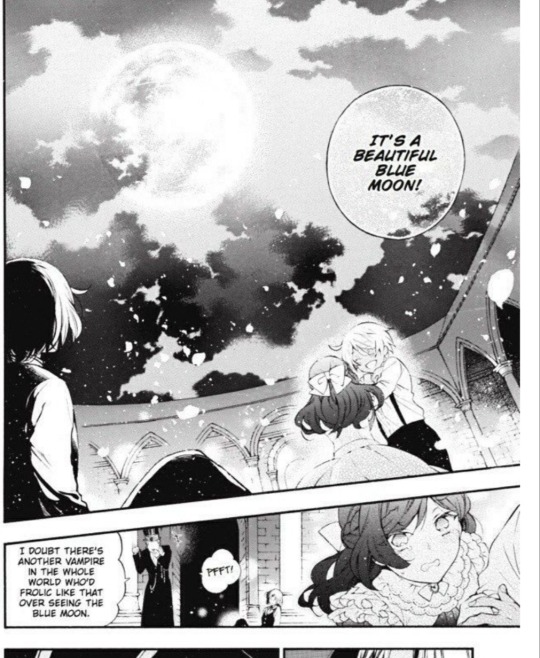
The Blue Moon: it's reiterated that Noé has never been bothered by it; something Louis notes as unique for a vampire. Again, his role of 'bridge' between the Red Moon vampires and the Blue Moon clan.
TRIVIA

• The pikes Louis makes are a clear reference to the traditional way of killing a vampire.
Thank you for reading!
#vnc#vanitas no carte#the case study of vanitas#vnc meta#vnc analysis#vnc noe#vnc louis#vnc dominique#vnc teacher#tentative analyses#tentative analyses: the case study of vanitas
19 notes
·
View notes
Text
Challenging his beliefs: Roland Fortis’s Birth Flower Analysis

Hello all, I’m back with Roland’s birth flower reading. 😵💫
His birth flower posts was hard for me to work with, not just because we don’t have enough canon material of him, but he’s a difficult character for me to understand. Like Olivier, I too gave up for a bit lmao.
These days, I’m on Twitter more, but will continue maintaining an archive of my posts on Tumblr with the original source on Medium. (Limiting my Twitter usage helps a bit lol).
Anyways, his post is below, hope you guys enjoy it.
https://medium.com/@sorenzi/challenging-his-beliefs-roland-fortiss-birth-flower-analysis-7e3b3f002f7c
#the case study of vanitas#vanitas no carte#floriography#the language of flowers#birth flowers#character analysis#character birthday#birth flower analysis#i don’t remember how i tagged this#roland fortis#vnc meta#VnC analysis
38 notes
·
View notes
Text
The recent chapter has reinforced what I’ve been screaming about Noé from day one. If you will not take anything else from Noé Archiviste, take this. To analyze him you are required to understand that Noé is disconnected from everything.
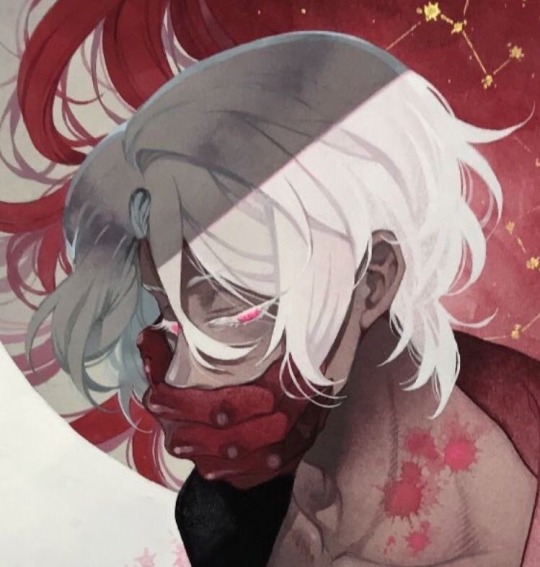
He is disconnected from himself, his past, the world, and reality. And this isn’t simply from being sheltered (though that plays a significant role). Because of this, he offers an honest, open and “pure” view of a situation. Even without going into the psychological rabbit hole mochijun executed in Pandora Hearts, you can see Noe’s lines/scenes are chosen with calculation and are very layered. A minor example, him getting lost all the time. It makes for a funny gag but it feeds into the point I’m making here. Conceptually, Noé is a floating balloon, hovering over the world. He can give you the best perspective because he’s not on the ground. That is why Noé sees himself as too strong or untouchable. Because he believes he is in a different world from anyone else. And I think this is something many people can relate to. But then it becomes complicated when Noé chooses to be unaware. Noé knows treating Dante and his companions like shit is wrong. But the gears turned in his head, people that he likes are doing something harmful. And he picks the option that won’t make him dwell on it: it’s an accident. Oh perhaps they didn’t know their names.
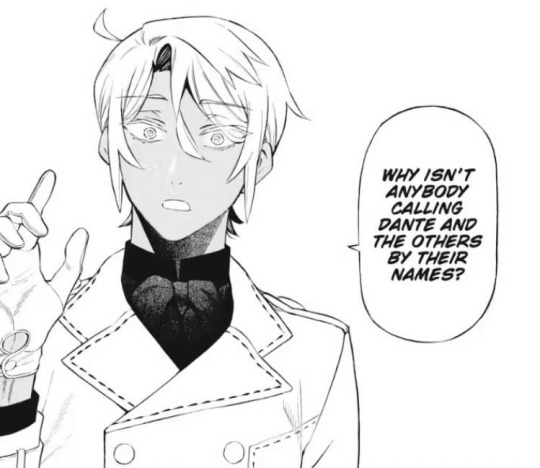
Noé depends on toxic optimism. From this we’ve seen it, several times throughout the story, turn into utter delusion. This is why some ppl, including myself, get Jack vibes from him. If you know you know, that man invented the word delusional. In order to keep himself together, to distract himself from his own self-loathing and loneliness, he has clung onto this thinking like a lifeline. Noe and Vanitas are very similar but chose different ways of coping which is a reason he is able to reach him. It’s easier to focus and believe in the beauty of everything else than looking at your own reflection. It’s easier to proclaim that the world is beautiful than to say that it wronged you and you feel so different and so you hate yourself.
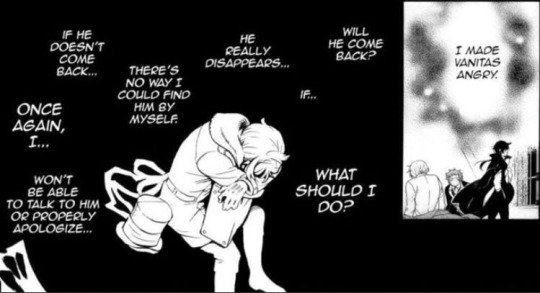
Which is why I believe Noé will be the final antagonist, anti-hero whatever the fuck. Not bc it’ll be a cool twist, the writing is on the wall. This is the logical destination of his character. Will he be saved at the end? Probably but who fucking knows mochijun. Noé is going be confronted with so many harsh truths and Vanitas dying is the biggest one. It is set in stone, an event that is fated to happen no matter what Noé does. Whether he’s time-looping this shit or living on alone. Vanitas’ death is the biggest reality Noé cannot escape from. And thus, that will break him. He will try to remain in his dreams, memories, and delusions. But eventually....you’re going to wake up.
#anime#manga#the case study of vanitas#les memoires de vanitas#vanitas no carte#jun mochizuki#vnc#vnc manga#noe archiviste#noé#character analysis#breakdown#such an amazing character#I’ll always love him
417 notes
·
View notes
Text
I think one of the reasons I'm absolutely insane about Jun Mochizuki's work is because she's the only person I've seen do a perfect execution of the "abused becomes the abuser" trope.
All of the characters in Pandora Heart and Vanitas no Carte are incredibly morally complex. They're heart wrenching, relatable, endearing, aggravating, and endlessly flawed.
MochiJun puts us in the uncomfortable position of confronting that victims can be perpetrators, that those who are hurt can hurt others, that sometimes, people you love are bad, and sometimes you love bad people.
Abuse is never justified; it's handled by different characters in a variety of ways. It's repressed, reciprocated, passed on, and stopped. MochiJun shows victims become awful people, not inherently because they were abused, but because of who they are as people and how that shapes the way they deal with abuse.
She shows victims as the complex people they are beyond victimhood. There are characters who are just and kind after facing abuse, and ones who are twisted and cruel. Most delightfully, she brings us characters who are both.
The heroes of her stories choose love, gentleness, compassion, and mercy. She shows that our choices matter, that our relationships are integral to who we are.
I think of how some of the characters, in spite of these forgiving traits, are not required to forgive their abusers in order to be seen as virtuous figures. They're allowed to stand their ground, even if it's violent to do so.
I think of how, at the same time, some characters are loved despite being abusive, because a tender character sees more in them than evil. Because abuse comes from people, and people are endlessly complex.
I think of how the heroes of the story tear themselves apart for the violence they inflict, and are shown the most painful love in return. How that love often comes in the form of calling them out on their bullshit.
I love the love in Pandora Hearts and in Vanitas no Carte because it's painfully human in the face of horrors beyond mortal comprehension.
I love the flaws in the characters because they're painfully human despite some of these characters' otherworldly natures.
Jun Mochizuki doesn't show us the abused becoming abusers to give us the idea that abuse is an unstoppable cycle, but rather to show that it is stoppable. To show that people have a choice in who they become. And that's one of the most wonderful and terrible things about people.
#alkafdjklfjklfdjfk i'm so normal about mochijun's work i promise#pandora hearts#vanitas no carte#vnc#the case study of vanitas#jun mochizuki#meta#analysis
232 notes
·
View notes
Text
Glad Mochijun let Chloé and Jean-Jacques both have a go at the heroine pose in their partner's arms. Equality.
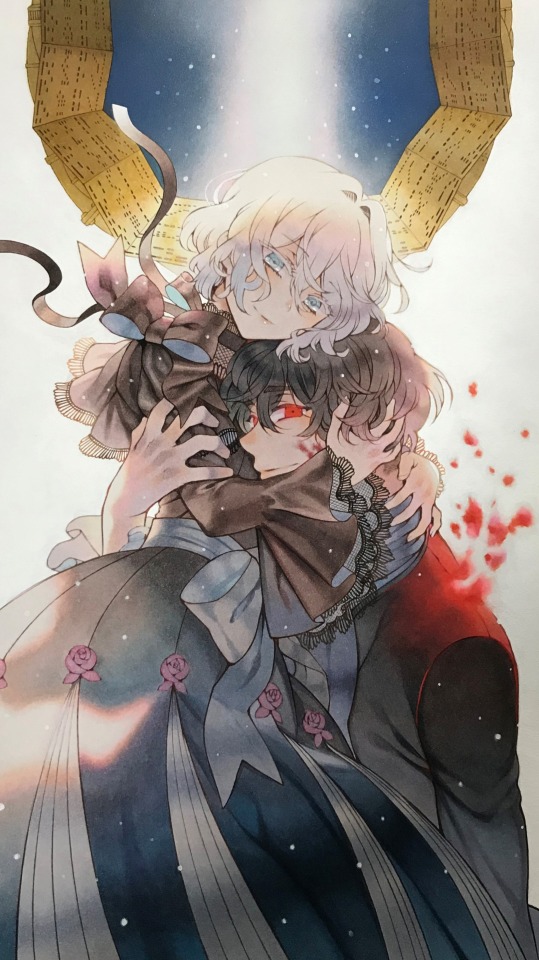

#personally volume 7's cover is my preference but both is good#I like the possessiveness in volume 7 lol#also in both the difference in size between their hands... cute#vnc#vanitas no carte#I want to talk about them with someone... I need to be really inane about it. no analysis. no thought. just ehehe cute.#i lovw them...#chloé d'apchier#jean jacques chastel
331 notes
·
View notes
Text
As much as I enjoy the idea of gay Noé, there's something so darkly funny about the idea that he actually is bi and attracted to women—he's just not into Domi specifically
#this wasn't prompted by anything I've just been thinking about it lmao#I don't have any stake in his sexuality genuinely#like he's clearly into guys. and I think a gay reading could have some interesting implications that I do enjoy#but with the early stuff with Jeanne. I could see him being bi#bi or pan or whichever#not for certain. but possibly#idk this isn't the post for serious analysis I'm just here to laugh at my poor girl Domi#vnc#vanitas no carte#jokes
93 notes
·
View notes
Text
Jun and details


In the latest vnc chapter we could see another attempt of suicide with scissors in Jun's works.
One failed (Astolfo's) and the other successful (Alice's).
I won't enter the mental state or the situation in which both characters were since Alice was determined to die and Astolfo wasn't in a good situation (and to analyse that it's to write a book).
I want to emphasise how well done are both panels to tell us, in a visually way, that Astolfo wasn't going to die:
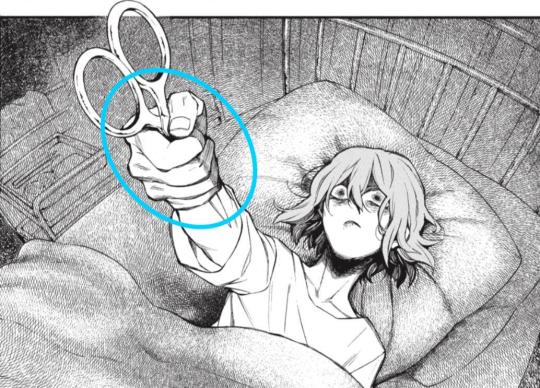
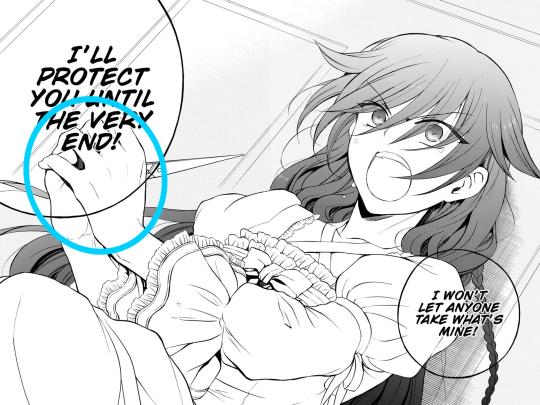
While Alice have the scissors by the handle and it's holding it with both hands in a very determined way, we have Astolfo holding the scissors with only one hand, very unfocused and by the blade, not the handle.
This made Astolfo to get some deep cuts, but not nearly to die, while Alice... Well, you know:
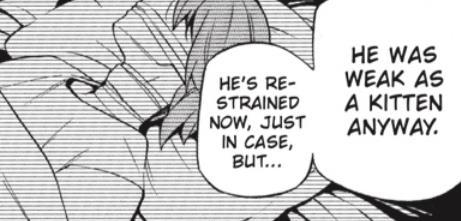
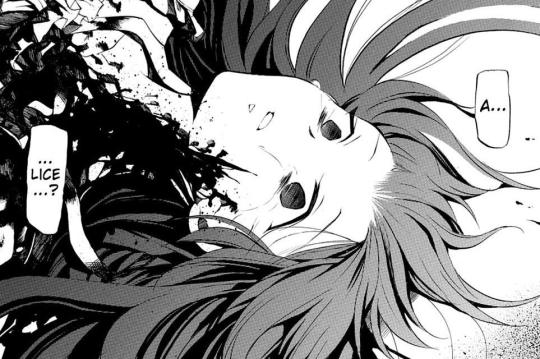
I love this because Jun could not have given it any importance and just made Astolfo take the scissors as Alice (for reference reasons) or taking it the normal way (which would have made much less likely to him to survive), but no, she chooses to give it a reason and not to tell us, but showing it.
179 notes
·
View notes
Text
Okay but...
Notice how whenever Noe got protective/defensive of Vanitas, he’d look at him with a shocked and disgusted face.

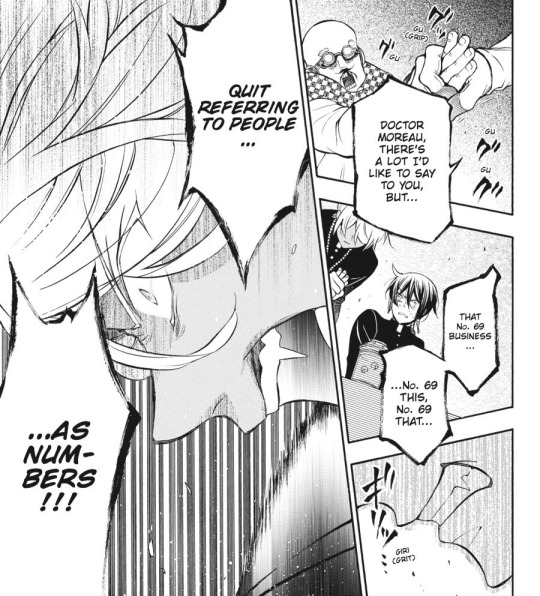
He’s stated that he’d never love someone who’d love him, but after these events and the ones with Jeanne, it got more serious, his mood less cocky than in the dance event.
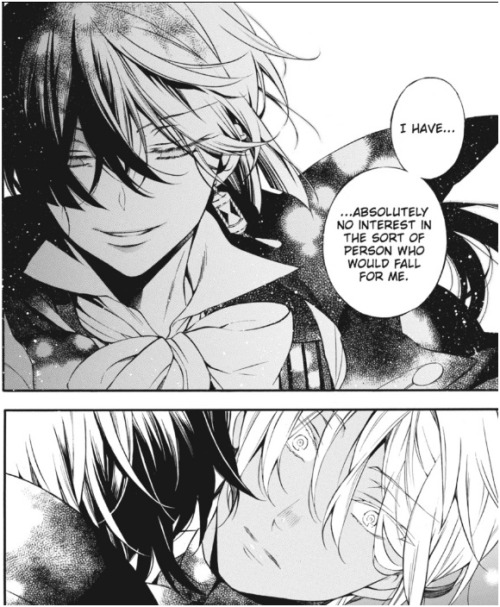
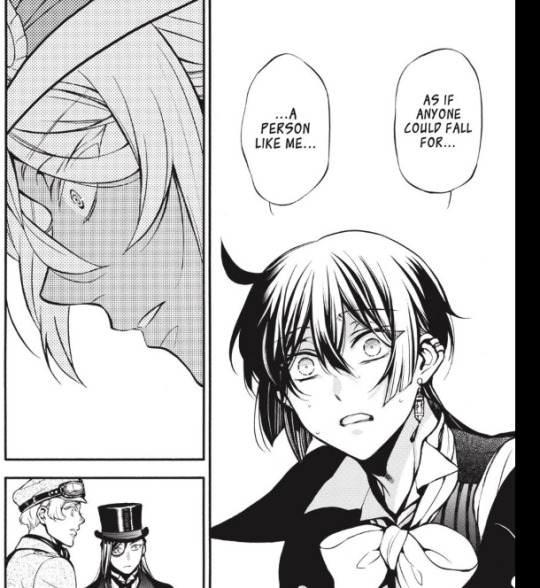
Someone loving and caring for him TRULY disgusts him, it appalls him, so seeing Noe care about him and go out of his way to put himself / the plan at risk to defend him truly puzzles him, he can’t take that people actually feel the need to care for him.
AND THEN WE GET TO THIS SCENE-
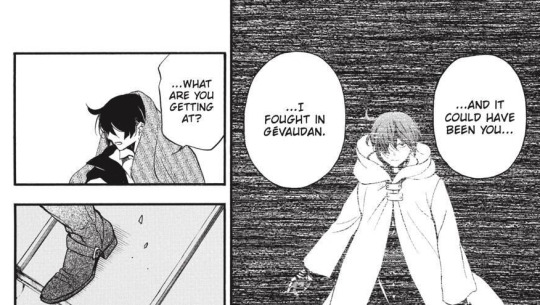

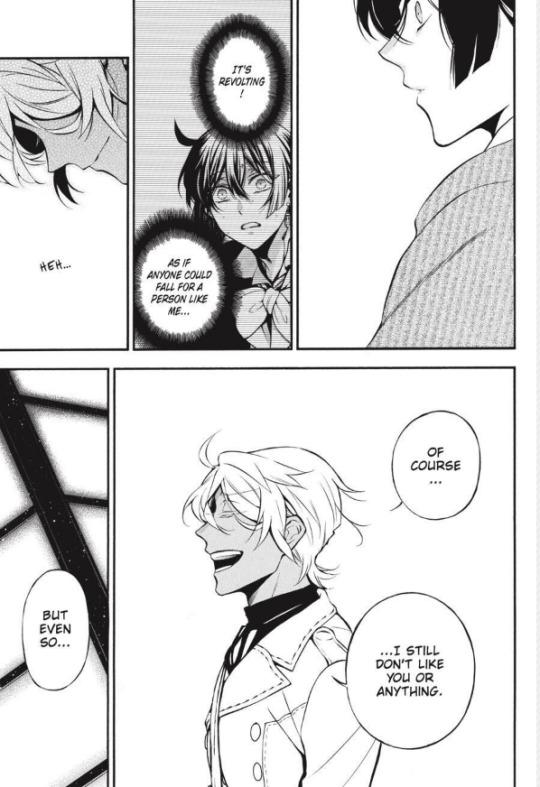
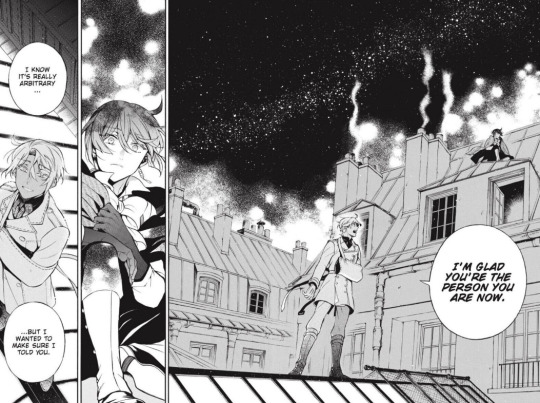

Even though Noe says “I still don’t like you”, it’s sassy bullshit because he made it clear in this scene that he likes Vanitas as a person, in the context if this was Noe’s flashback, it means that Noe wanted to make sure Vanitas knows that he cares for him and values him. If it was Vanitas's flashback of that scene, it could be his mind changing gears, realizing “shit, people can actually love me”, and that last panel is a whole bunch of feelings happening, and he even fails to talk properly.
And if it’s both of their flashbacks, hats off to the author for making this scene so fucking romantically loaded.
(*cough* the blanket Noe gave him being a symbolism for his care for him, and in those last panels, he’s holding onto that blanket tight)
--
This confirmation that Noe likes him, and he deep down knows that he cares for Noe too, a LOT, makes it difficult for him to kill Noe, or even say terrible things to him, he literally covers his face so he doesn’t have to look Noe in the eye, and Noe actually sees his face while saying all that shit, full of sadness, desperation, and fear.
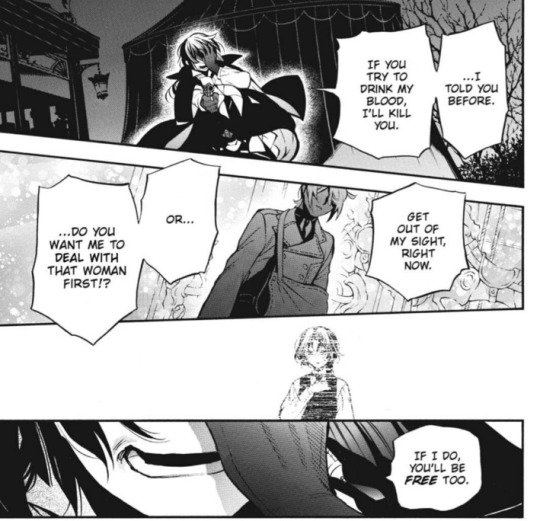
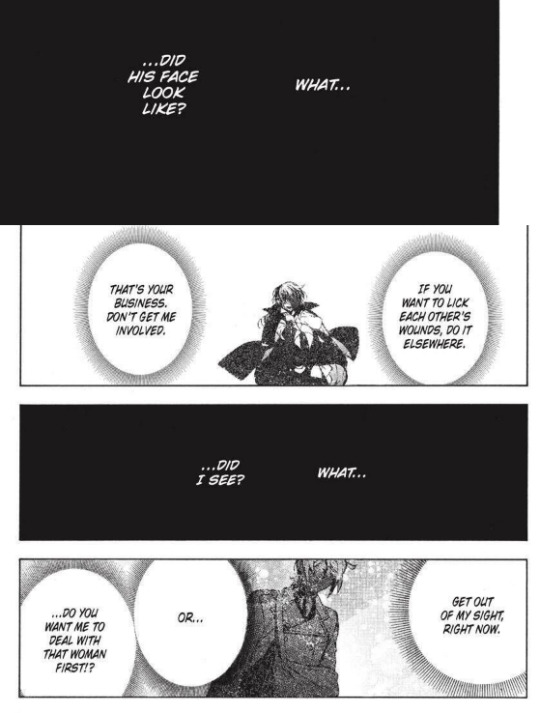

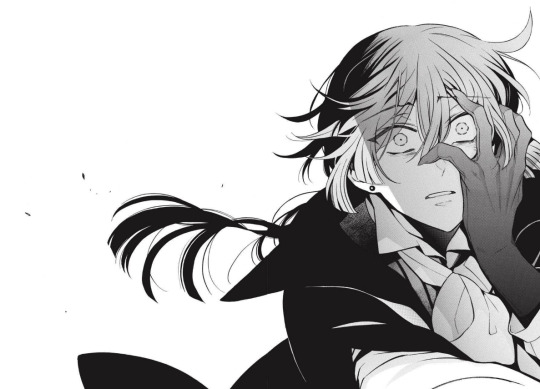
Vanitas gave himself something to protect, someone to care about, and it disgusts him.
____________________________
Images sources:
1
2
3
The rest from manga scans online
696 notes
·
View notes
Text
Something about Jeanne just feels really much like finding comfort in her own inescapable misery and ultimate doom.
No, i should put it another way. The concept of self, agency and autonomy has pretty much been a running theme for vnc. Notably, the main 4 (i'd like to call them the main 4) all struggle with asserting themselves and their identity, as well as taking control over their life and death in one way or another.
In Jeanne's case specifically, she is constantly established as a tool, a weapon for execution, and get deprived of choice in the process. She either falls victim to manipulation or the whirlwind of her own trauma. So far her arc has technically centered around allowing herself happiness, breaking from the weight of the executions she had conducted against her will, nurturing her inner child even.
But i think she has also accepted that ultimately she is never free from being a killing machine, and gaining complete freedom is impossible. There are similarities in the way that Jeanne and Vanitas asking their loved ones (not so sneakily inserting my poly agenda here) to end their lives, but there are also differences. For Vanitas it is expressing vulnerability, learning to rely on others (specifically Noé) instead of trying to handle everything himself, a bit of "I've always wanted to die, but from now on I'm giving my life to you". For Jeanne it is becoming at peace with her own doom, entrusting him to set her free from her misery, "I know I will definitely die, and when that moment comes I want you to be the one to do it".
Her happiness and joyful personality at this point of the manga is truly a delight to see, but it also falls in line with Carpe diem - sieze the day. She embraces the present, for she does not know how long it will last.
76 notes
·
View notes
Text
THE METAMORPHOSIS OF NOE’ ARCHIVISTE
I have an admission: I never particularly liked the so-called ‘cinnamon rolls’. They’re the pure characters, the goody-two shoes, nice, always loving, who never get angry (tenderly upset at most), want to save everybody, uwu, protectatallcosts … and not much else in the way of personality. They often end up as the blandest in the character cast.
When they’re given some depth, it’s often to show that they’re hypocrites and actually the exact opposite of what they present themselves as, absolute bastards with no redeeming traits; an archetype that often ends up just as stereotyped and flat as the ‘pure’ version.
That’s why, when I find a Cinnamon Roll that’s well and truly good and kind, and at the same time has darker characteristics that make them a multidimensional character, I tend to absolutely love them. This is the case of Noé Archiviste.
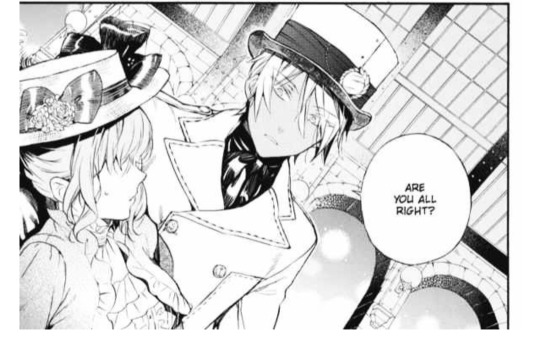

Noé starts out as the most straightforward Cinnamon Roll: he’s nice and polite to Amelia, he rushes to adorably stamp himself on the glass when they first get in sight of the city (revealing he had a sheltered, country upbringing in the meanwhile), and when Vanitas ambiguously rushes on the scene, appearently attacking Amelia, he chivalrously runs to defend the distressed damsel. Said damsel ends up using him as a snack, but it’s the thought that matters.
Right after, he saves Vanitas from the fall, with a little aside to muse on the beauty of a moon that most vampires consider a bad omen; something he did even when he was little. Back to Vanitas, he wouldn’t want to help him, initially, because he doesn’t like him, something he says with an utterly candid honesty; but further talking with Amelia and remembering why his elusive Teacher sent him to Paris to begin with change his mind (on helping, not on Vanitas).
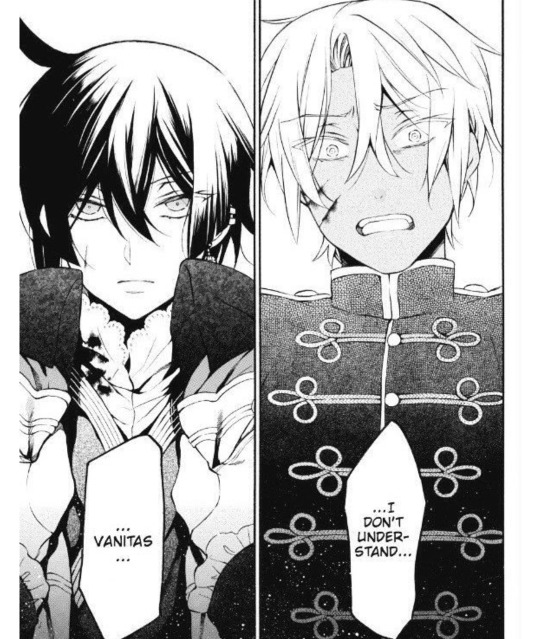
But between the Loup Garou and the Bal Masqué arcs, here appears an interesting characteristic of Noé: a tendency to place people into slots. Vanitas, who introduced himself as someone who could save vampires from Malnomen, was promptly labelled as someone who could never fail, as per his own words. When it happened, or at least it happened in the eyes of Noé, and they stumbled upon a cursebearer too far gone to be cured and could only be mercy killed, Noé snapped.
But he himself realized his mistake. Vanitas never promised him anything, it was him who pushed his expectations on the other. He acts as the most stable person in the asylum that is VnC: he goes to Vanitas and apologizes, declaring his interest in actually following and helping him, as a person, not as a savior on a pedestal.

In the Catacombs Arc, he has his first very serious argument with Vanitas. The reason is quite simple: he was lecturing Vanitas on the fact that he was weak and so shouldn’t have exposed himself to danger; this paired with putting himself at risk to protect him. Classical heroic behavior, except that it pisses off Vanitas to no end.
The doctor - who, unknowingly to Noé, is currently fighting against an onslaught of horrible memories and trauma - explodes at him, to the point of calling him slurs, and going on a tirade against ‘people who are strong, but make themselves weak’, meaning those who will sacrifice themselves for the sake of others.
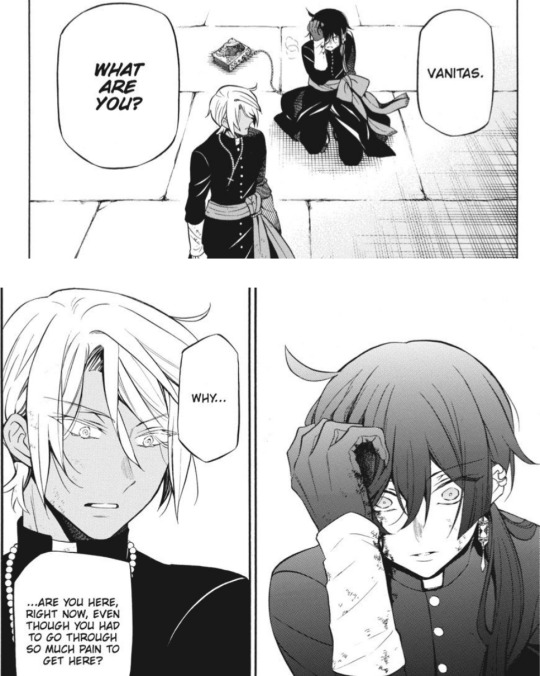
Now, Noé really didn’t expect such a reaction, but if there’s one thing we can say about him, is that he learns. From that moment onward, he never again treats Vanitas like some frail little creature, instead regarding him as an equal. At least explicitly, we’ll get there in a moment.
So, Noé concludes his role in the Catacombs Arc all heroic and ispirational. Next thing he does, is falling headfirst in a very obvious trap Ruthven set up for him. He likely didn’t expect it, not from someone in such a respectable position as a Senator, playing well into the classical naivete of a Cinnamon Roll; but it resulted in a mistake that now puts him under Ruthven’s control, and he doesn’t even know it.
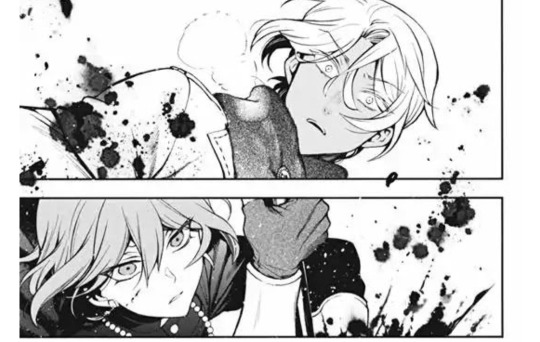
During the Gevaudan Arc, he once again tries to play nice against an enemy: he finds himself in front of Astolfo, a mere fifteen-years-old, but a fifteen-years-old who’s hell-bent on killing him and actually has the means to do so. This wouldn’t mean he would be easily capable to defeat Noé, but our resident Cinnamon Roll is too busy trying not to hurt the kid to put up a proper fight.
The one to set him straight is Vanitas, the one who had previously faced Astolfo by playing absolutely lurid with psychological warfare. He points out that his life is in danger, and in their current situation they can’t allow themselves any weakness: Noé needs to stop having care for child adversaries, and fight at his full capacity. Please set aside this teaching for later.
Admittedly, Noé is kind of on the sidelines for the Gevaudan arc. This isn’t to say that he doesn’t do anything, but still he doesn’t receive the same level of focus as Chloé or Jeanne; this is basically their arc. He mainly reacts to what is going on around him: he expresses shock at Chloé’s appearent decision to side with Naenia, pities Jean-Jacques, runs around trying to protect and save Vanitas. All good, ‘appropriate’ reactions to what’s happening.
And he takes Vani’s advice on how to fight Astolfo very seriously. He finally gives his … most, because at the end of it, the kid is still standing, with most of his wounds due to abusing the Chasseur’s drug.
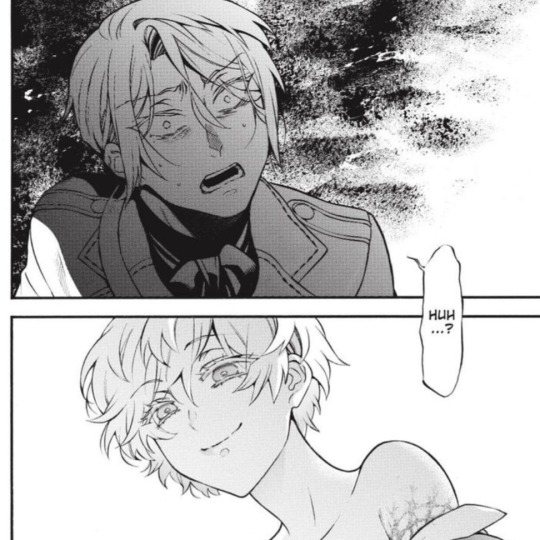
Then the Amusement Park arc happens. And oh boy, if our Cinnamon Roll isn’t shaken to the core.
First, his childhood friend is placed in danger, bringing the trauma from Louis’ death in the forefront of his mind; then he is forced into a blood-drinking he doesn’t want, by a child of all things; then he finds himself in front of Vanitas, who loses the softer demeanor he has had this recent chapters and reverts back to his cold self, refusing to do anything to save the last friend Noé has. At this point, Misha orders him to fight Vanitas and forcibly drink his blood. And Noé does so.
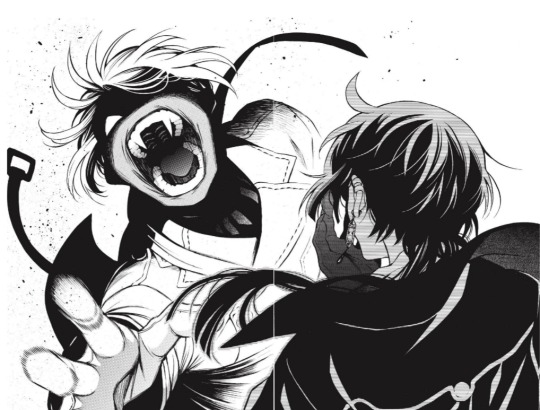
Look how this ‘cinnamon roll’ is being portrayed right now: a disproportionated mass of fangs that lunges on. That’s the representation of a monster. Vanitas goes from ‘cold and detached’ to 'absolutely terrified' in the span of less than a second. He fights back, but this clash is uneven; the vampire can destroy the whole park with little to no effort, while Vanitas has to inject himself with the Chasseur drug just to avoid him.
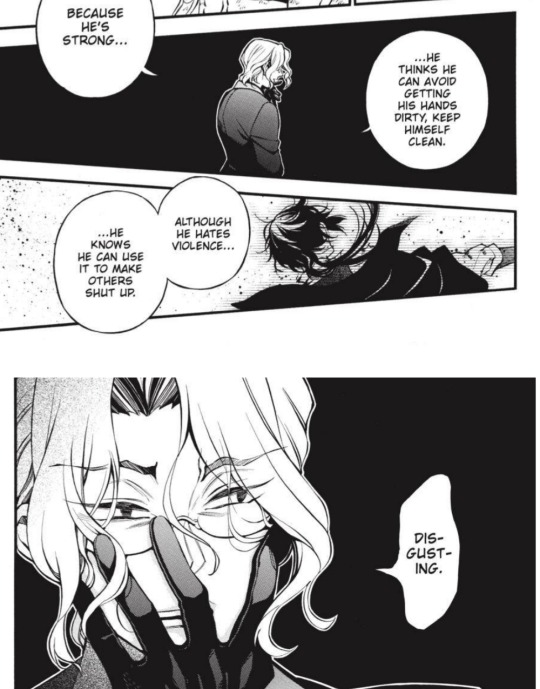
What makes the whole situation even more interesting is Johan’s disgusted comment. He observes that Noé is strong, and confident in his strenght; he never really had to do whatever it takes just to stay alive, and that, not some particular moral superiority, is why he can play the benevolent part, the role of the one who won’t stoop to certain lows in a fight.
This allows the weaker Vanitas, who is used to fight tooth and nail to just survive, a margin of advantage; but it’s not definitive, and the situation isn’t truly resolved between the two, it’s resolved by Jeanne.
She ran up to the amusement park, saw the situation, basically undestood everything in a glance and 1) saved Dominique, removing the need for a conflict between Noé and Vanitas; 2) yelled at Noé to take a good look at his opponent, to ‘truly’ look at him. This proved to be vital: suddenly Noé realized the expression of absolute terror Vanitas had, and a split second later he saw his own expression in a mirror - one of absolute fury.
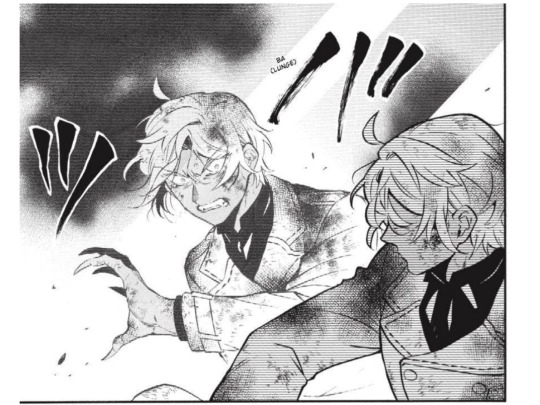
This clashes so much with the idea he has of himself, of who he wants to be, that he stops dead on his tracks and reconsiders the situation. Now lucid, he can get back at reflecting on his misgivings about Vanitas, about what he messed up and what he can do next, and go on to be the sensible, self sacrificing part in the fight.
This endangers his own life by a lot, but in the end, even the brainwashed Vanitas can’t bring himself to kill him, and ultimately collapses from the exaustion of the fight, the drugs and the emotional stress. The situation here is averted, and then Teacher arrives on the scene and distracts everyone with his mysteries.
Then, there is yet another rooftop confrontation between Noé and Vanitas, with a guest star appearence by an heavily bandaged Misha. It’s the first time we see both of our heroes so calm and collected, even talking things out (what’s this heresy?). It’s the scene where Vanitas drops the bomb: if he were to be killed, he would like to be killed by Noé. And our hero says nothing to this; but he leans on Vanitas, wordlessly showing him trust and then he helps him rise up, like he had done in the catacombs.
Now, the reason I find Noé so interesting is in two elements. The first can be expressed via Johan’s comment: Noé’s kindness is due in no small part to his own strength, to his underlying awareness that he is powerful and, should he fail the diplomatic strategy, he would probably win over most dissidents (especially those he already pegged as ‘weak’ like Vanitas) by sheer force. I mean, this is not a very charitable interpretation - it reeks of condescention a mile wide. Noé’s willingness to talk things out wouldn’t be born of (or at least, not entirely) actual respect for others and a love for pacific communication, but from a gracious concession, that can be revoked anytime.
It also gives him a disadvantage: when he thinks that his opponent is weaker (that is, most of the time), he gets concerned about them. He can’t be too rough on them, the poor little things wouldn’t be able to survive his might! And this comes to bite him in the ass because, as pointed out by Johann, when people fight believing that their life is in line, they give everything they’ve got, overpowering someone who’s techincally stronger but holding back.
So, there is this interesting little spin on the Cinnamon Roll who wants to resolve things by talking; it’s not a complete subversion, it’s an exploration on why he behaves like that and why this behaviour might not be inherently ‘pure’.
The second is the constant growth that is demanded of him. I’m used to stories where the Cinnamon Roll archetype starts out pretty much as good as he cana get and spends the plot turning people better by supporting them; at most, they must learn to Not Be So Naive.
The plot of The Case Study of Vanitas is Noé starting out as sheltered, recognizing that he is, and try to improve himself. Noé is constantly analizing his own behavior: he learned not to push his own expectations onto the others, he learned that people can have complex and painful backstories and that he can empathize with them, but he can also recognize their pain and decide that he can’t abide their behavior anyways. He is in the long, awkward process of trying to stop seeing other people as inherently frail and in need of his protection, but also stop seeing them as ‘not a problem, I can shut them up if I really want to’.
Personally, I don’t think that this will be the kind of story where the naive protagonist turns into Gruff Hardass one beating after the other. I think that by the end, Noé will have suffered a lot; he will have experienced even more traumas that those he already has, and get some more things to feel guilty about under his belt. But I don’t think he’ll ever lose his idealism. He might be tempted, but he’ll refuse to lose hope and become like Ruthven, turning into an ispiration for whomever survives of the current cast.
And with this, I think I exhausted this little and fairly pointless rant.
Thanks to anybody who bothered to read my ramblings!
#vnc#vanitas no carte#vanitas no shuki#the case study of vanitas#vnc meta#vnc analysis#vnc noe#vnc vanitas#vnc mikhail#vnc astolfo#elia's recaps#vnc teacher
171 notes
·
View notes
Text
Since I am such a normal individual I’ve decided to attempt breaking down vanoé’s character song “Le Formidable”. I don’t hear much talk about it but the lyrics are just as cryptic and wild as the OP/ED.
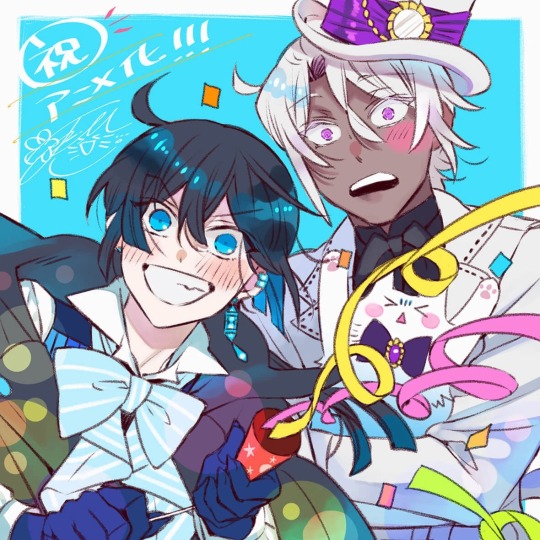
Before we get into it, in terms of translation, I could only find one on YouTube that thankfully color-coded the lyrics so I could decipher who sings what. If anyone has any other translations, I’d love to know please. So a bunch of the lines you can kinda figure out who’s singing but here’s how it’s gonna be:
Vanitas =💙
Noé =💜
Vanoe= 💙💜
Simple enough let’s get into it :)
💜: /I want to stay in bed feeling the warmth of the sun and drift in and out of this sweet dream/
Already we’ve mentioned dreaming, a running theme in this song. There is the well-known line Teacher says in chapter 55...
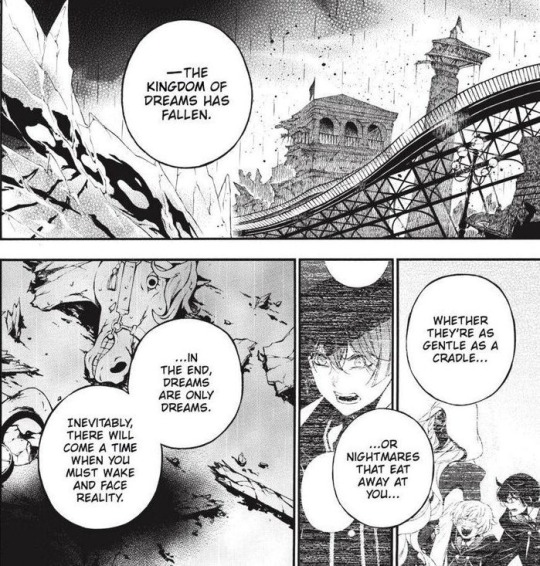
Sleeping, specifically in regards to Noé, is something mochijun makes the audience take note. He can’t sleep without holding something. When he can’t fall asleep, it is highlighted like the night Vanitas rejected Noé drinking his blood. He doesn’t want Vanitas to disappear and I personally like how in the recent chapter, Vanitas stays by his side for a while. Almost like callback to that moment on the train but I’m getting carried away. You get the correlation I’m making, it’ll get very important later on.
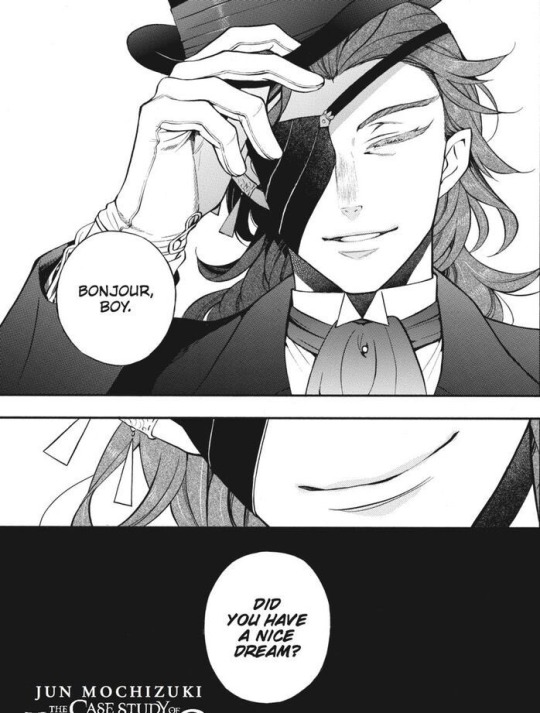
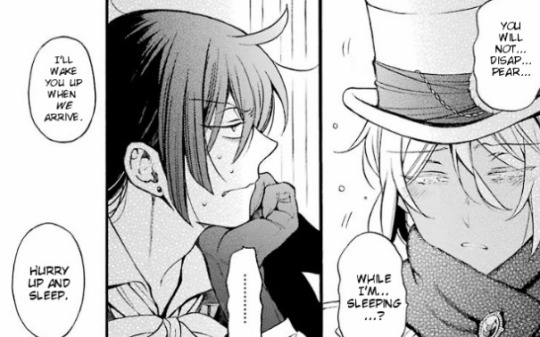
We also have those warmth and sun connections to Noé, a large part of his character and Vanitas’ gravitation towards him.
💙: /With this grey weather today, this day will go by without any harmony/
We see Vanitas’ pessimistic outlook on life; grey, cloudy, devoid of color. Devoid of comfort and obviously these two contrasting people will clash but mix together throughout the song.
💜: /Tarte Tatin, Altus Paris! Endless interesting things!/
💙: /It’s always like this! Here and there, endlessly losing sight./
This seems pretty straightforward, Noé is getting distracted by all the wonderful things as usual and Vanitas chastises him. But let’s frame this another way, Noé is choosing to not focus. It’s simpler that way. He’s turning his focus elsewhere to better things, more pleasant things. And Vanitas is trying to wake him up. I’ll explain more in my theory soon.
💜: /What to look for today from this city/
💙: /Ah with all these things/
💙💜: /There is no time to rest/
Simple lyrics here. No comment.
💙💜: /Le formidable! Le formidable! It’s really easy. Just colliding, rolling down, and repeating again/
Here we are entering the chorus. There’s a common thread of repetition in every OP and ED in VnC. Like clockwork, these two have fallen into this pattern.
Colliding- Vanoé meeting, two worlds learning how to come together, joining as one
Rolling down- their downfall, incoming despair and tragedy
Repeating again- they find themselves back where they started, fated to be born and to die
Let me say the first part of my theory and keep this in the back of your head while remembering the lyrics: VnC is not a time loop in the traditional sense but rather a loop of memories. Also keep in mind the first ED Zero: “Now I remember, oh I have never lived a day without you. Untie the layer of memories...”
💙: /This worthless-/
💜: /wonderful-/
💙💜: /world we are walking on. Even not knowing is sometimes nice, right?/
Again, vanoé with different outlooks on life meet each other. But more importantly, we see the display of ignorance or blissful unawareness. We the audience have a vague idea on how this story ends and in a way, so do they. Vanitas knows very well he is doomed and has already entrusted Noé to end his life if it comes to it. But we also don’t know the specifics of their downfall and neither do they.
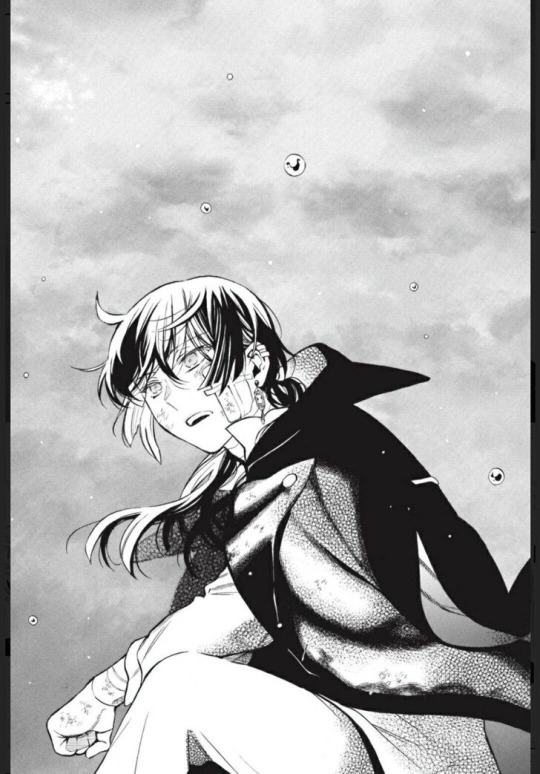
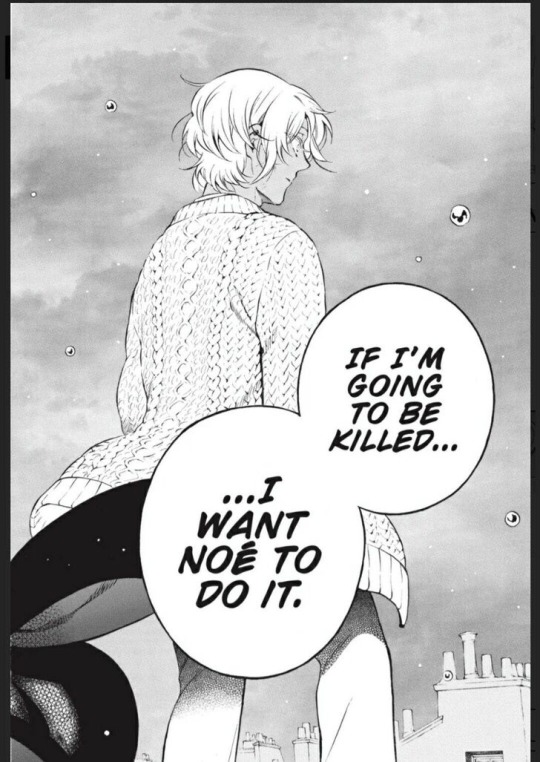
So this line has a double meaning that refers to the characters and the reader. As yeah it is nice to read vnc and enjoy the happy moments without knowing the painful details of what’s to come.
💜: /Over there something is flapping their wings/
💙: /And these uncountable days pass by. It’s not worth worrying about. So many unknown things, without meaning/
💜: /Escalier! I want to see the bright colors beyond!/
Noé, again giving his attention to supposedly insignificant things as Vanitas tends to see the larger picture, not caring for the mundane. Uncountable days can be matched with the grey weather mentioned earlier. But that also means things are murky, blur together, cloudy. They don’t make sense to Vanitas (such as love, his self-worth, the nature within people) while Noé wants to experience all the brightness of the world.
💙: /I told you to be quiet today, yet here we are!/
💜: /Now you loud person!/
💙💜: /I told you I hardly have time to breathe/
So, hypothetical scenario if we take this song literal: Vanoé is exploring the city because Noe wanted to Vanitas couldn’t say no. Vanitas is fed up and Noé thinks his complaints are aggravating. But this part shows a lack of understanding. They’re yelling about their own hardships but don’t see the other’s perspective.
💙💜: /Le formidable! Le formidable! It’s a simple thing. It’s just finding, losing sight and repeating again/
💜: /I want to dream/
💙: /It’s just a dream/
💙💜: /The world keep walking while not knowing the truth at this point/
Ok there’s a lot to dig our teeth in here. First of all, the finding, losing sight, repeating is another way of describing the colliding and rolling down said prior. Vanoe find each other, they lose each other, it’s fated to happen all over again. Now the big piece here, I want to dream/It’s just a dream. Surface-level interpretation > another instance of their differences. Noé wants be surrounded by dreams and wonder. While Vanitas looks at that beauty and scoff at it, since it isn’t real therefore not worth caring for. But if we read into this carefully, Noé wants to dream. He wants to stay in these memories, he doesn’t want to live in a world without Vanitas.
Let’s go back to OP 1: “I love this world and the light only you give me.”
We know OP 1 is Noe’s POV so let’s ask ourselves why would the Noé we are seeing, the one smiling at all the colors of the world say Vanitas is the only light he has (emphasis on “only”). Because the Noé singing the first OP is operating with far more knowledge and despair. We don’t know the truth at this point. “This world” is not real.
Allow me to offer what I think is happening. Noé and Vanitas meet, they go on this journey of understanding, trust, and love, Vanitas reaches his end and is killed by Noé. Noé lives on. We can tell the Noé writing this story is full of regret and sadness. But why is he writing this all down? He’s retelling the memories, putting them down physically on paper. Two things happened:
a) He exchanged his name with Naenia, wishing to remain in a world with Vanitas in it. Because that wish is still very present, Naenia has great interest in Noé. She mentions seeing him before in Louis but it could be a classic mochijun misdirect and it’s actually from receiving his name in a different iteration. There is that official art with Noé wearing Vanitas’ coat with that goat entity he saw in Gevaudan, pinned to his vest.
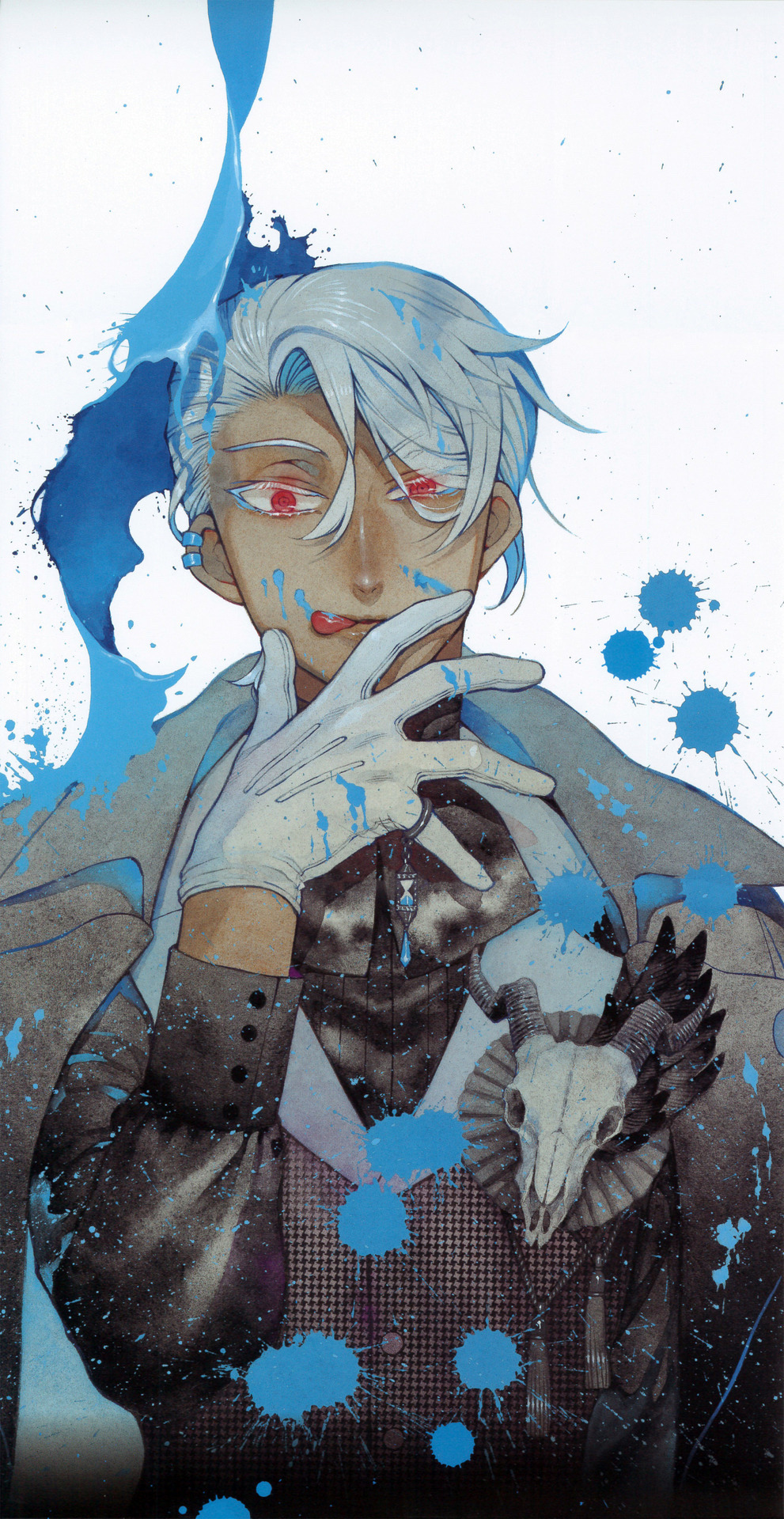
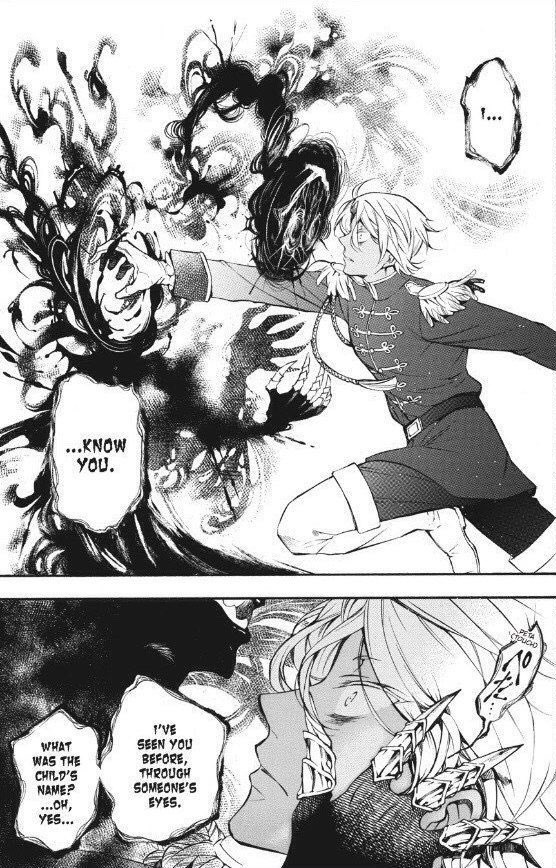
However this can only work if Naenia is still around and isn’t resolved/defeated in the memoirs.
b) This is more likely in my opinion. Noé uses the Books and the memoirs act as a catalyst for him to have the world become his memories or for him to live in them. I know only those with blue blood or something can use the books.
Which is why Dr. Moreau had those experiments with Vanitas and Misha. Don’t worry, I already have a theory that Archivistes are some form of blue moon vampires but that is a whole other discussion. Point is, I think the Books of Vanitas are like an Elliot sword situation. Yes, Elliot owns the Nightray sword and carries it around but you don’t know its true purpose in the story until Leo wields it.
Noé causes these memories to replay, perhaps to save Vanitas or simply to dream again. Go back to when he was last happy. But here’s the thing, the Noé in this memory is unaware or ignorant of this, sees his present world as the real one and undergoes the events of the series. Vanitas dies, he lives on, and creates a memory world for himself. Rinse, recycle, repeat. Essentially, the first ED gave it away. The entirety of VnC is a layer of memories. Even the narrator Noé we are hearing is a memory that is trying to manifest a world of his own.
Reality and dreams are all intertwined now and Noé got lost in it. There are leaks in the cracks, for example when Vanitas cries and tells Luna his mother died at childbirth why would he call to her. Initially, you can read this as he’s just missing what he never had. But what if Vanitas’ mother was present in his life 9 memory loops ago but because these memories get further from the truth the more it happens, Noé simply forgot that detail when making the memoirs at some point in time. So now, in the memory layer #52 Vanitas has no mother.
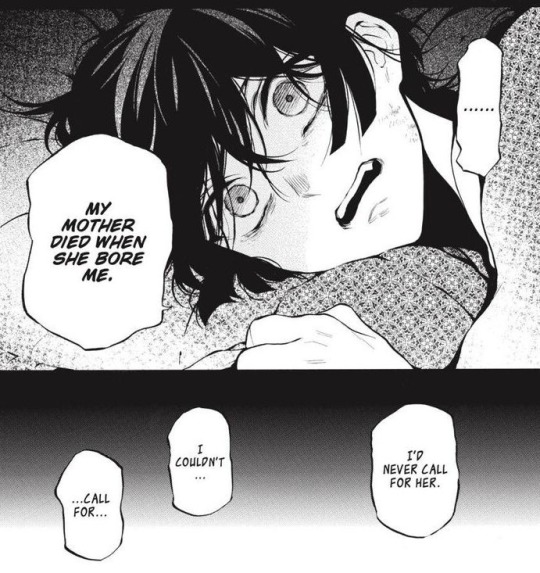
💜: /We will see what we “cannot see”/
💙: /We will know what we “don’t know”/
💙💜: /The final stop of this world that seems to be changing, seems only further ahead/
Noe’s line possibly goes into his Archiviste nature and how he experiences reading memories. It can as well build back into the dream/memory loop thing, he’s seeing things he can no longer “see.”
Vanitas’ line can be drawn to what Noé said during their fight.
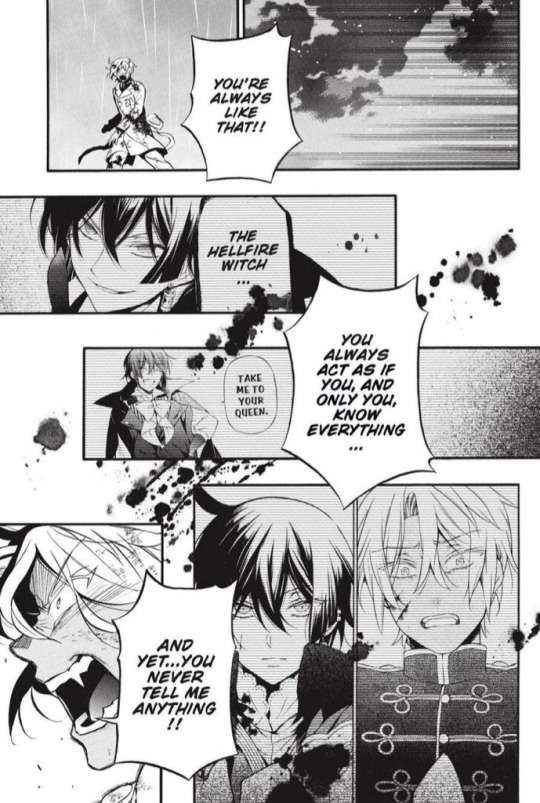
Vanitas acts like he has the final word and has a full grasp of how this world/himself works. But he really doesn’t and Noé is living proof of that, proving him wrong on several occasions that there’s still hope, they can’t give up yet, he won’t leave him etc. The final stop of this world is changing, but it’s further ahead. This is a story, a preserved section of time from the past. We gotta ask ourselves... why would the last stop be changing? Again, Vanitas’ death is the final stop but it’s changing, perhaps from the countless iterations we’ve gone through Noé writes the memoirs in a way that delays the ending. So he could remain just a little longer…
💙💜: /Le formidable! Le formidable! Everything is fine. While forgetting, hiding, and repeating it/
💙: /This worthless/
💜: /wonderful/
💙💜: /world we are walking on/
💙: /I don’t know but even so/
💜: /If it can make you smile.../
After this, it ends the song by repeating the first chorus with the colliding-rolling down part so I’ll make this the cutting point. The “everything is fine” totally doesn’t stick out in a story where we know everything will not be fine. The forgetting and hiding goes back to my dream-memory theory, Noé is hiding from the truth in these stacks upon stacks of memories and is possibly forgetting things as they really happened as a result. We already know he isn’t the most reliable narrator. But Noé wants to see Vanitas’ smile.
If it can make you smile again, if it can replay your laughter, why would I ever leave this wonderful lie? In OP 1: “Your laughing was reflected by a daydream”.
I’ll conclude this by saying two things. If you want to get even deeper, you can interpret Vanitas in this song as the voice in the back of Noé’s head. Its just a dream, this world is actually worthless, and Noé is trying to drown out those thoughts. Because yeah they sing lines together but the only time they’re directly speaking to each other is when Vanitas scolds Noé and Noé shouts back, calling him loud. Finally, I could be wrong in all this. I am aware how crazy I may look and I'm so thankful if you read this far.
But yeah if this is anywhere near canon, mochijun must be the most unhinged, absolutely cracked author I’ve ever seen. We’re going into Pandora Hearts levels of intricacy here. I hope you enjoyed my insanity 👍🏼
#anime#manga#les memoires de vanitas#the case study of vanitas#vanitas no carte#jun mochizuki#vnc manga#vnc#noe archiviste#noé#vanoe#song#lyric breakdown#analysis#theories#memory loop#Vanitas#I’ve lost it fr#I love this so much tho#tumblr#fyp
163 notes
·
View notes
Text
Noé's color scheme and his role in the narrative are so interesting! VNC does the whole red and blue dichotomy, but Noé's color is purple. Throughout the story so far, we've seen that he takes a very in-between stance on things, notably with the human-vampire conflict. He's been isolated from the larger world and all sorts of conflict that comes from it. His role as an "archivist," and the writer of a "case study," is very observational. Continuously, Noé is placed in the role of someone who's a neutral third party. I'm so curious as to how this role will play out and whether or not it will change.
153 notes
·
View notes
Text
all i’m going to say is that as a black american person reading the new vnc chapter, i did chuckle a bit when vanitas was explaining oppression to noé…it was funny to me ok?
#and like this is probably mostly about the fact that the 100% think that noé is a person of color#which i could probably do real analysis about on another day#but i laughed aloud a bit at the end#he doesn’t even know. that poor boy. he doesn’t even know.#vnc#vnc 62#noé archiviste#vanitas#the case study of vanitas#vanitas no carte
33 notes
·
View notes
Note
Do you think that Vanitas and Noé could get together in spite of the manga being written in a shounen publication? Has there been any examples from other shounen of openly queer characters that are the main characters and not side characters or antagonist/villain characters?
Y'know, I genuinely don't know.
I'm not aware of any examples of queer main characters in shonen manga, but it's not like I've read every single series in the demographic, so my not knowing it doesn't guarantee it doesn't exist. Openly queer main characters in shonen are definitely not the norm, though—let alone making the two male protagonists a canon couple.
If it's happened, it's happened in something niche enough for me, an avid queer manga reader, to have never heard of it.
However, a lack of precedent doesn't mean something is impossible. For one, Gangan Joker is not Shonen Jump. It's nominally a shonen magazine, but surfing through its listed titles, there's a fair bit of variety in genre. A couple of the series it publishes are described as (straight) "romantic comedies" on Wikipedia, so I think Mochizuki has a lot more freedom with her content here than she would if she were sharing page space with, like, My Hero Academia or something.
Furthermore, VnC as it stands is already deeply queer. Noé drank Louis's blood and wants Vanitas's, and the blood drinking in this series is made erotic more often than not. Luna is explicitly nonbinary. Dominique. If there's ever going to be a shonen manga to break boundaries with regards to canonically gay main characters, VnC is a lot more likely than most other series to make that mark.
Personally, I think there's good odds that Vanoé are going to end up in the "heavily implied but not technically explicitly canon" category. They'll have a lot more scenes of Ambiguous But Intense Passionate Feelings about each other, and eventually Noé might realize that the "feelings stirring in his chest" are about Vanitas, and they'll have some nice homoerotic blood drinking towards the end. But nobody's ever going to explicitly say "he's gay and in romantic love with him."
I could be wrong, though. Maybe chapter 12's line about Noé's stirring feelings will end up foreshadowing for something with Domi or Jeanne (though I doubt that right now), and Vanoé will end up in the "implied but not too heavily" category. Maybe I'll be pleasantly surprised and they'll straight up come out and say that Noé's got romantic feelings for a man. But as of right now, I wouldn't put my money on either of those ends. Vanoé could genuinely happen, which is more than I can say for, like, any other gay shonen ship, but it's far far far from a sure thing.
#I mean these bitches are gay one way or another#I just don't think there's a reasonable het reading for their whole Thing#but the question is whether or not they'll explicitly say 'he's not straight.'#or if it'll stay at this current level where a small bit of analysis is required#I may theorize. but I make no claims to be able to actually predict mochijun#ask#anon#the gay agenda#meta#vnc#vanitas no carte#manga
105 notes
·
View notes